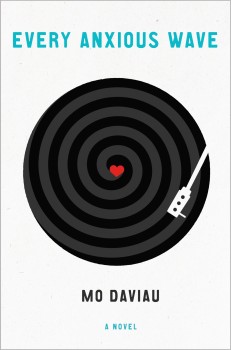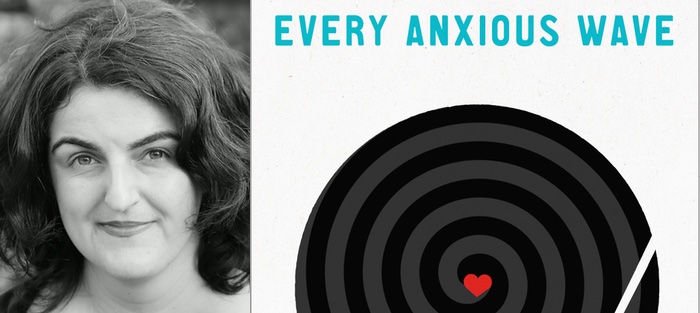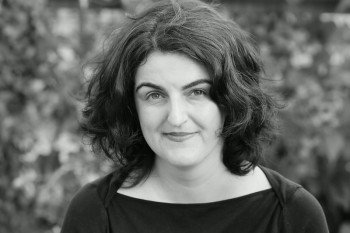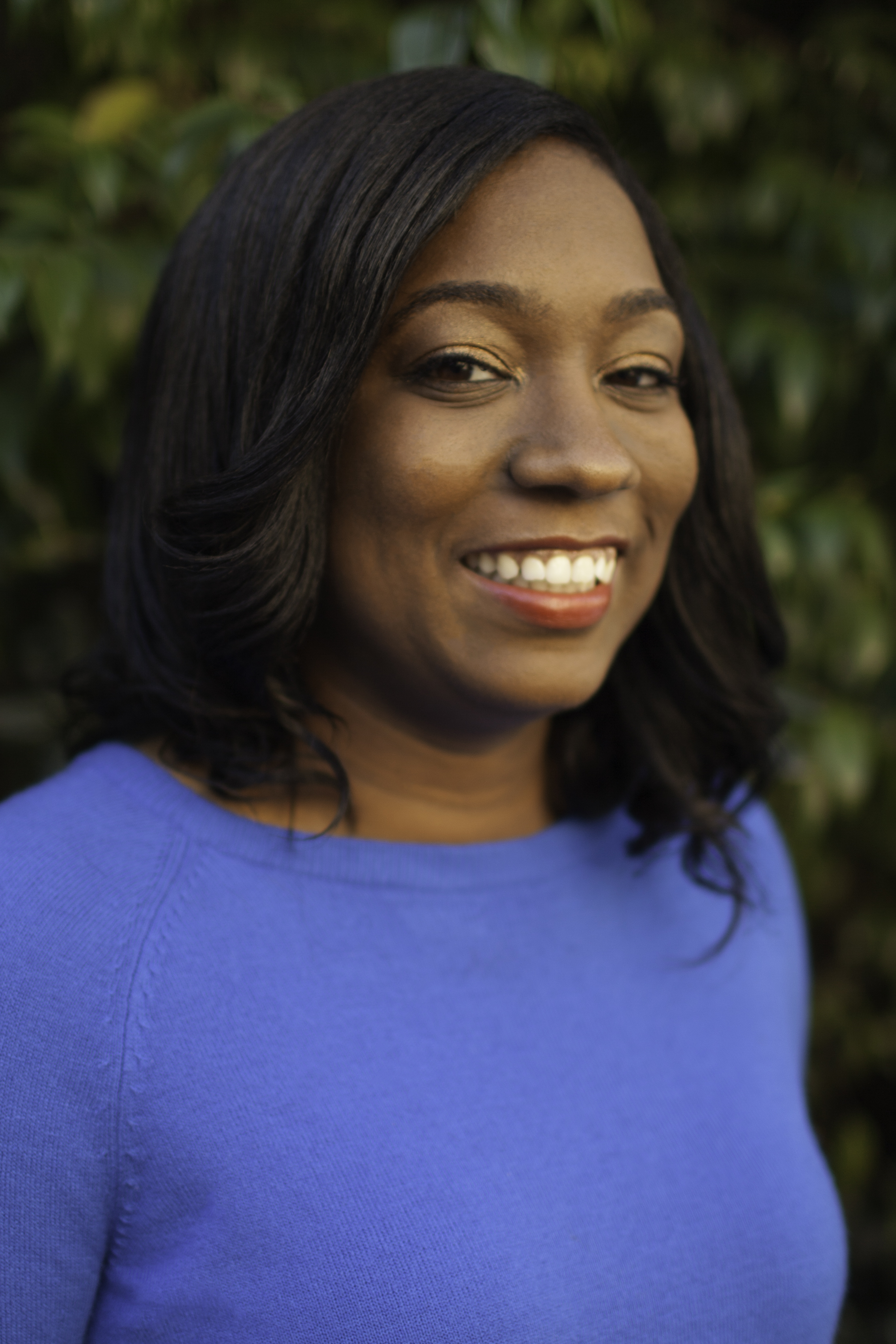Voltaire’s comedy Candide questions optimism and whether or not it’s possible for a human being to be satisfied when presented with the life of their dreams. Does the garden of life cultivate us, or is it possible for us to cultivate the garden of our own life? And if by chance we stumbled upon a utopian world of perfection, would we stay?
Similarly, imagine that one day you wake and discover a wormhole in your closet, one which allows you unfettered access to travel through time. Potentially, you can go to any place in the world, alter history, rewrite your own life, or even become immortal. What would your quest be?
In Mo Daviau’s humorous and skillful literary debut, Every Anxious Wave (St. Martin’s Press), Karl Bender does just that—he discovers a wormhole that can transport him back in time, allowing him to revisit live music shows by his favorite bands. Things seem pretty dreamy for Karl, who has no intention of screwing up humanity or history by altering space and time; he simply wants to dance the night away and have a shot of tequila, or two. And soon he and his friend Wayne DeMint create a side business for like-minded music fans.
But as life seems destined to lead us into a cycle of drama and suffering, Karl and Wayne run into complications when Wayne decides he wants to meet John Lennon in New York City and is accidentally transported by Karl back to 980 Mannahatta, instead of 1980 Manhattan. (“Mannahatta” means “my good home” in Lenape, the indigenous language of the region at this time.) Enlisting the help of an astrophysicist, Lena Geduldig, Karl attempts to retrieve his friend. Though this is only the beginning of a series of wildly funny events involving an equally fascinating string of characters that the reader will encounter in Every Anxious Wave, a novel that manages to weave together fabulous music, time travel, and the possibility of true love—with snappy pop-cultural radicalness to boot.
Mo Daviau was born in Fresno, California, and currently lives in Portland, Oregon. A former librarian and independent bookseller, Mo is also a solo performer, having performed at storytelling shows such as BedPost Confessions and The Soundtrack Series. She is a graduate of Smith College and the Helen Zell Writers’ Program at the University of Michigan, where Every Anxious Wave was a Hopwood Winner. In this interview we discuss the playfulness of dramatics, her personal life, and the challenges that female artists can face.
Interview:
Nina Buckless: What was the seed or germ for this book?
Mo Daviau: I used to ask people what bands they’d want to go back in time to see if they could. It’s a fun little ice-breaker question. I started the novel in 2010, on a night when I was being particularly self-loathing. I thought if I could just crank up the song “Sally Wants” by Henry’s Dress loud enough, I’d be taken back to 1995 and I’d make totally different decisions for myself. That didn’t happen, but I did start writing this book, which is the next best thing.
Can you share one or two surprises, or learning experiences, from first to final draft?
This book passed through a lot of hands and saw a lot of eyes on its way to publication. It was mine and mine alone for a year and a half when I arrived at the Helen Zell Writer’s Program in 2011. Then it went through two years of workshop and became my thesis. By the time I’d graduated, I’d signed with Jenni Ferrari-Adler, my fabulous agent and fellow Michigan alum, and she and I worked together on rewrites before she put it up for sale. Then I worked with my editor at St. Martin’s, Brenda Copeland, on even more rewrites. All together: four years of spit and polish.
I always thought of novel-writing as a lonely, solo practice, but with all the thumbs in the cake-frosting on my novel, I’d say that workshopping and feedback and rewriting is, for me at least, a collaborative experience. Belonging to my independent writing group here in Portland is really important to me for this reason: I really benefit by having outside structure and accountability in writing something as long as a novel. Structure as in other people will expect to see twenty pages from me on such-and-such date. Accountability as in putting your butt in the seat and writing. And also accountability in the form of fresh eyes that can point out inconsistencies in your story.
Any particularly wise words of advice from former professors or mentors along the way?
I often go back to Michael Byers’s “vodka vs. potatoes” analogy of building fiction [from his essay “Metaphysical Description, or How Many Potatoes Make How Much Vodka?”]. Potatoes basically equals the plot/facts of the fictional world and vodka is the exposition (i.e., what is distilled from the plot).
Now I’ve given away the big secret of the Michigan MFA program.
 There is a sense of limitless possibility in the book, much like the field of astrophysics. How much scientific research went into this project?
There is a sense of limitless possibility in the book, much like the field of astrophysics. How much scientific research went into this project?
Oh, very little! Karl’s first-person point of veiw is the ultimate scientific cheat-out. If I’d written it in Lena’s first-person voice, I’d have had to do a lot more research. I mostly just asked the scientists in my life how things would work. My good friend Sarah’s dad is a physics professor, and he sent me a bunch of articles. My ex-husband is a nuclear scientist, and one day he and I sat down and he explained to me with science how it could be that Karl remembered Lena, but Lena did not remember Karl. The graph he drew that day is the graph in the book. A housemate of mine in Ann Arbor happened to be a physics post-doc, and I have her to thank for explaining to me the Einstein-Rosen Bridge.
If you could go back in time yourself and see a band, where would you go and who would you see?
I’d either go back to Athens, Georgia, 1980, to see the very first REM show in the church, or I’d go back to that night at the Continental Club in Austin where my most favorite musician, Davíd Garza, was doing his weekly gig and he gave me a big, sweaty kiss on the cheek. (I think that was in 2010—I’ve been seeing him perform for fourteen years now, so forgive me for not remembering the date.) Or the Sleater-Kinney show I saw at the Iron Horse in Northampton, Massachusetts, in 1997.
I imagine if there really was a wormhole set up like Karl and Wayne’s, there would be many attempts at saving John Lennon!
In addition to having worked as a librarian and a bookseller, you were a college radio DJ. What was that like?
I’d been obsessed with college radio and what was once called “alternative rock” since I was about eleven. I used to sneak into the living room at that age to watch MTV’s 120 Minutes—back in the late ‘80s, “alternative” music was relegated to this two hour show on Sunday nights at midnight, and I was completely obsessed. I figured out they played this type of music on the Fresno State radio station; this was back when “left of the dial” guaranteed obscurity and weirdness.
I DJ’ed at WOZQ all four years I was at Smith. Part of it was my way of being “cool,” I guess—being the consummate “indie kid” and knowing and loving the bands. The other part of it was that music was important to me for, like, mental health reasons, if that makes sense. It also provided me with a small community. The title of the book, Every Anxious Wave, is a lyric from the song “Kath,” by the band Sebadoh. I played a lot of Sebadoh back at Smith, and the real Kath from the song also went to Smith and DJ’ed at WOZQ. There was certainly a tribal element to fandom for me.
I wanted Doc Marten’s very badly in high school, but I have ridiculously narrow feet, so they never fit right.
You also have a background in theater, and you were a performer. Can you share some of that side of your artistic life? I’m thinking of some of your most prized improv moments…
Are you thinking of the time in grad school when we were stuck in the basement of the art museum after Lysley Tenorio’s reading and Michael Byers made me do stand-up comedy to entertain the crowd as we waited for the tornado warning to lift? Yes, I like to jump on stage and tell stories and be entertaining. I love public speaking, which makes me an oddity in the writing world.
I love that story! We could always count on you in a jam. That was a memorable night, too. You got the good funny-gene, so to say.
I used to do a lot of improv comedy. When I lived in Austin, that was my creative outlet and community, and how I spent pretty much every weekend for about ten years. Now I mostly do readings and storytelling shows. Bedpost Confessions is a sex-themed storytelling show in Austin that I’ve been a part of since its inception in 2010. I love performing and Bedpost Confession, in particular, has a cool social and emotional justice aspect to it that can be very healing for audience members when they hear our stories and think, “Oh, wow! I’m not alone.”
Does your background in theater play into your work as a fiction writer?
I approach writing a novel as if it’s one long improv scene in my head. Writing for the stage is a lot different than writing fiction. I’ve never been formally trained as a playwright, but I have done some playwriting for a theater company in Austin. One issue that came up in edits with my agent with Every Anxious Wave was that, in an earlier draft, it was very dialogue-heavy. Like a play! So now I’m mindful of writing more interior scenes in fiction. More vodka!
Recently, your piece “The Cardigan” was published in The Butter, the essay series curated by Roxanne Gay for The Toast. It was both intimate and compelling, and at times downright terrifying. Would you be open to sharing how that piece came about? What were you feeling when you first sat down to write it? What was your intention behind writing it?
“The Cardigan,” my essay about one particular way a former partner emotionally abused me, started out as a piece for Bedpost Confessions. I’d met the man I now call my abuser at the show. We dated for a year, very intensely. Emotional abuse is particularly insidious, because the abuser makes you believe that you’re misunderstanding everything, or that the problems in the relationship are your fault. It doesn’t look like what most people think of as abuse. I wanted to warn others to be careful when someone bright and shiny falls madly in love with you, leaves their current partner for you, then starts to lie to you and gaslight you, tells you you’re not that special after all, and then finds a new person with whom to start that cycle over again. It’s actually not a very original story. It’s the “idealize-devalue-discard” narcissistic relationship cycle that’s written about in Psychology Today and other psych/recovery websites and books.
At the time I wrote “The Cardigan,” I was what I called “sick.” I had been diagnosed with Post-Traumatic Stress Disorder. I literally felt crazy, like something was stuck in my brain. I couldn’t sleep, barely ate, had panic attacks and breakdowns in public all the time. People don’t understand that emotional abuse is a physical injury to the brain. I wanted to write that piece to warn people that what happened to me was far more than a “bad break-up.” He swooped into my life with all this romance, found my vulnerabilities, and then used them to destroy me. That’s abuse.
I was proud to have that piece run in The Butter. I wanted to write something visceral about what I’d gone through, as a warning to others. After it was published, I started hearing from readers, men and women, who had similar stories to mine. Turns out, emotionally abusive relationships with narcissists are pretty common, likely because they tend to be very charming and attractive and can go through many short-term relationships.
Nowadays, we have the Netflix series Jessica Jones, which is a frighteningly accurate depiction of the mechanics of abusive relationships and what it’s like to live with PTSD.
Can you give us some basics on what Narc Abuse might be identified as? Many people may not be aware of what to look for or where to begin if they are concerned.
On my website I have a page of resources for how to recognize the red flags of Narcissistic Personality Disorder. There are pretty boilerplate patterns to watch for, actually.
I’d say that the old saw “if it seems too good to be true, it probably is” applies when you find yourself swept away by someone who claims to know and love you quickly after meeting you, and thinks nothing of tossing aside their partner to start up with you because you’re “so special.” There is a certain vein of feminist rhetoric I want to apply to that one, which is “you are not special.” My essay “You Are Not Special,” in The Offing (which is a Dead Letter Office letter to the woman my abuser left me for), is about this. I’ve read that piece in public a few times, and when I say whom the letter is for and then the title, people laugh, like I’m saying I’m special and she’s not, which is not what I’m saying in that essay at all. What I mean by that is, we need to put an end to any sense of competition between women. I tell myself that I’m not special all the time. I’m not better or worse than any other woman. If women saw men pulling that act as a precursor to abuse, or at least something self-serving men do to leverage emotional labor from women, and not as a grand romantic gesture, there might be fewer broken hearts in the world.
Thank you. What we can expect from you in the future?
Most of what I write these days are short essay-type pieces that are meant to be read onstage. I just wrote two pieces for shows in the month of December—one is for a mixtape-themed show, and the other is for a show called Grief Rites, where I’ll be eulogizing my father.
I’m working on two novels right now. One is a multigenerational sprawler that’s going to take me a few years, about a matriarchal religious sect’s rise and fall. The other, which has been a lot of fun to write, is a romance novel about a widower who becomes enchanted with a YouTube relationship guru and attends one of her weeklong retreats and, of course, falls in love. I’m really into spiritual leaders right now, about how desperately we want someone to give us the answers to the problems of life, but that they are fallible human beings, too, and how in recognizing that we forgive them, and, by extension, forgive ourselves.







